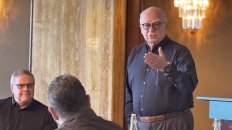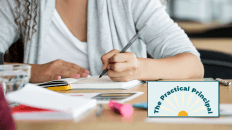In August, the 2020 Teachers of the Year for Region 13 were announced, and we couldn’t be more thrilled with the results. Dozens of talented and inspiring teachers from across our region were nominated, and two were ultimately chosen: Deirdre Doughty and Keri Swanson.
We interviewed Keri Swanson, an elementary teacher at Bee Cave Elementary in Lake Travis ISD, here’s what she had to say:
How did you get your start in education? What lead you to a career in education?
Prior to pursuing a career in education, I received a Master of Arts in Clinical and Counseling Psychology and became a Licensed Professional Counselor, a license I still hold today. My previous professional experiences include working in the Bipolar Disorder Research Clinic and Child and Adolescent Psychiatry at The University of Texas Southwestern Medical Center. I also worked as a Career Counselor at St. Edward’s University. My career transition into public education began in 2014. While obtaining my certification in EC-6th, Special Education, and English as a Second Language, I worked as an aide in the Life Skills classroom at Lake Travis Middle School and in the Social Development Classroom at Bee Cave Elementary. Upon obtaining my certification, I was blessed to be offered a 2nd grade teaching position in a general education inclusion classroom. It was in these rooms that I truly felt my education, previous professional experiences, and passions perfectly intertwined. I have been teaching 2nd grade at Bee Cave Elementary ever since and I truly believe it is exactly where I am meant to be.
What areas or subjects do you currently teach? What do you like about them?
Currently, I teach all core content subject areas. My teammates and I are each responsible for writing lesson plans for a particular subject which helps make the workload more manageable. I prepare our social studies and science plans each week. I really love teaching science and writing. In science, my students and I discuss how we are all scientists and how science is all around us. I particularly enjoy watching students’ excitement grow as we conduct science experiments.
The beginning of the year writing lessons are very difficult for some of my students. They feel insecure, frustrated, and overwhelmed when it comes to their writing abilities. Through hard work, practicing a growth mindset, and a lot of support and encouragement, I have seen my students blossom into wonderful, confident writers. The proof is evident in their big smiles when they compare their beginning of the year writing samples with their end of the year writing samples.
What do you think the hardest part of teaching is / being a teacher? What would you suggest to a teacher currently struggling with that problem?
The hardest part of teaching for me is that it is a profession in which the public has many understandable misconceptions. I had them too before I started teaching. After all, we don’t know what we don’t know. As a teacher, my main goal is to assist students in being successful. I encourage them to become lifelong learners, while also helping them develop into the person they are and will become. As a parent, I like to think I know my children better than anyone, but as a teacher I have come to the realization that their teachers know them in a way I probably never will.
One of the hardest things I have faced as a teacher is when my observations and concerns for a student are misconstrued by a good intentioned guardian. What I have found to be helpful when confronted with such a situation is to have consistent and open communication with the student’s guardian, solid data, and the support and expertise of my school administrators. In the end, if educators and guardians work together for the best interest of each child, the outcome is far more beneficial for the student.
What’s the best part about teaching?
The best part about teaching is the relationships I build with my students, new and old. The beginning of each school year I make it a point to learn as much as possible about my students through community building exercises, observation, work samples, and the support and assistance of their parents/guardians. Learning about each students’ likes and dislikes, hobbies, after school activities, family, and what makes them feel successful and confident is invaluable. I use that information throughout the year to connect with my students and to incorporate it into my lessons as much as possible. Doing so makes school more authentic for my students while also letting them know I truly care.
What advice would you give to new teachers?
My advice to new teachers is to be kind to yourself and work closely with a mentor teacher and/or your team. I have to admit, eight weeks into my first year of teaching I honestly thought, “What have I gotten myself into?” I felt exhausted, overwhelmed, and insufficient in my teaching abilities. Through taking many deep breaths, working with my team and mentor teacher, and taking it one day at a time, I was able to find my groove.
How do you maintain a positive work-life balance?
I am a work in
progress when it comes to maintaining a positive work-life balance. I have to
remind myself that I may not be able to get to everything I want to do for my
students, but at the end of the day, they will always have what they need, will
be learning, and will feel respected, valued, and loved. I definitely
prioritize my to do list and set manageable goals. I don’t always accomplish
everything I want to and that’s ok. In order to take the best care of my
students, I have to make sure I am taking care of myself and my family too.
What are some new educational tools that have benefited your classroom?
There are so many excellent educational tools that have benefited my classroom, but some of my go-tos are: Reflex Math, Lexia, Spelling City, BookNook, and Code.org (for my auditory learners and technology lovers), STEM bins, Chipper Chats, Toothy, and Versatiles (for my kinesthetic and visual learners), and finally, Storybird and math and reading mysteries for my reading/writing learners. For classroom management, my students and I both love Class Dojo. I am always looking for new educational tools that provide my students a variety of ways to learn and grow because it’s what keeps them engaged, motivated, and challenged.
Cole Bubenik is a Content Marketing Specialist here at Region 13.





Add comment